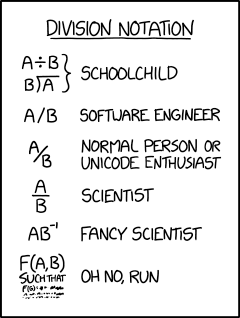Computational Complexity (2023)
This essay explores Computational Complexity, most notably the growth of functions with Big-Oh notation, this essay also includes graphical demonstrations of different types of complex functions represented as mathematical functions.
Symiosis: a Vim-centric keyboard-driven, notes app inspired by Notational Velocity. With instant search, in-place Markdown rendering and built-in editor ⌘ Read more
Lobsters Interview with Zdsmith
I had the pleasure of interviewing, befriending @zdsmith whose passions are very close to my heart. He explores the different forms of notation (Iverson, Naur), makes combinatory programming approachable, ported J to Janet, created an ergonomic notation for requirements gathering, designed his own [shorthands](https://blog.zdsmith.com/series/sh … ⌘ Read more
Passing of Jean-Raymond Abrial
Jean-Raymond Abrial, father (in particular!) of the Z notation, but also of the B method, and then Event-B, passed away on May 26. I was surprised to see that this piece of news, which may be of some interest to formal method folks, doesn’t seem to be very well known (there’s not much material on the web).
Here are some links (on LinkedIn, sorry):
[by Bertrand Meyer](https://www.linkedin.com/posts/bertrandmeyer_i-am-saddened-to-report-from-todays-print-activity-7335684948974034944-SJf1? … ⌘ Read more
How can one write blazing fast yet useful compilers (for lazy pure functional languages)?
I’ve decided enough is enough and I want to write my own compiler (seems I caught a bug and lobste.rs is definitely not discouraging it). The language I have in mind is a basic (lazy?) statically-typed pure functional programming language with do notation and records (i.e. mostly Haskell-lite).
I have other ideas I’d like to explore as well, but mainly, I want the compiler to be so fast (w/ optimisations) that … ⌘ Read more
Notary Project announces Notation v1.3.0 and tspclient-go v1.0.0!
The Notary Project maintainers are thrilled to announce the latest releases, including notation v1.3.0, notation-go v1.3.0, notation-core-go v1.2.0 and tspclient-go v1.0.0! These new versions are production ready and have successfully completed a comprehensive security audit. Check… ⌘ Read more
Det er fjollet og tvetydigt at kalde en model med 6x10^9 parametre for “6B”.
Jeg pauser tit for lige at oversætte ting som “trained on 1.5T tokens” til “trænet på halvanden billion tokens”; eller “contains 13B parameters” til “indeholder 13 milliarder parametre”.
Ikke engang de engelsk-talende lande er enige om store talnavne.
Der findes allerede standard-notation for store tal. Vi burde nok sige “6G” i stedet for “6B”.
Det er ekstra dumt fordi “B” normalt betyder “byte”… ⌘ Read more
Bypassing OGNL sandboxes for fun and charities
Object Graph Notation Language (OGNL) is a popular, Java-based, expression language used in popular frameworks and applications, such as Apache Struts and Atlassian Confluence. Learn more about bypassing certain OGNL injection protection mechanisms including those used by Struts and Atlassian Confluence, as well as different approaches to analyzing this form of protection so you can harden similar systems. ⌘ Read more
Division Notation
 ⌘ Read more
⌘ Read more
2
 ⌘ Read more
⌘ Read more
cistercian numerals [[https://en.wikipedia.org/wiki/Cistercian_numerals]] #links #notation
notation as a tool of thought [[https://www.jsoftware.com/papers/tot.htm]] #links
@prologic@twtxt.net it is some interesting work to decentralize all the things.. tricky part is finding tooling. i am using a self hacked version of the go openpgp library. A tool to add and remove notations would need to be local since it needs your private key.
@prologic@twtxt.net this is a go version of Keyoxide.org that runs all server side. which is based on work from https://metacode.biz/openpgp/
OpenPGP has a part of the self signature reserved for notatinal data. which is basically a bunch of key/values.
this site tries to emulate the identity proofs of keybase but in a more decentralized/federation way.
my next steps are to have this project host WKD keys which is kinda like a self hosting of your pgp key that are also discoverable with http requests.
then to add a new notation for following other keys. where you can do a kind of web of trust.
Helmut Lachenmann has an interesting notation system for stringed instruments: [[https://www.youtube.com/watch?v=GZt3UfNDNV0]] #links #composition #notation
a music sequencer, but for producing continuous gestures instead of discrete steps. have it be clocked with an external source so it can play well with others. perhaps build a notation system around it. #halfbakedideas
Cognitive dimensions of notations - Wikipedia https://en.wikipedia.org/wiki/Cognitive_dimensions_of_notations
QOTD: “No notation without denotation”
”“It’s Just Matrix Multiplication”: Notation for Weaving” by Lea Albaugh - YouTube https://www.youtube.com/watch?v=oMOSiag3dxg
GitHub - Jam3/math-as-code: a cheat-sheet for mathematical notation in code form https://github.com/Jam3/math-as-code